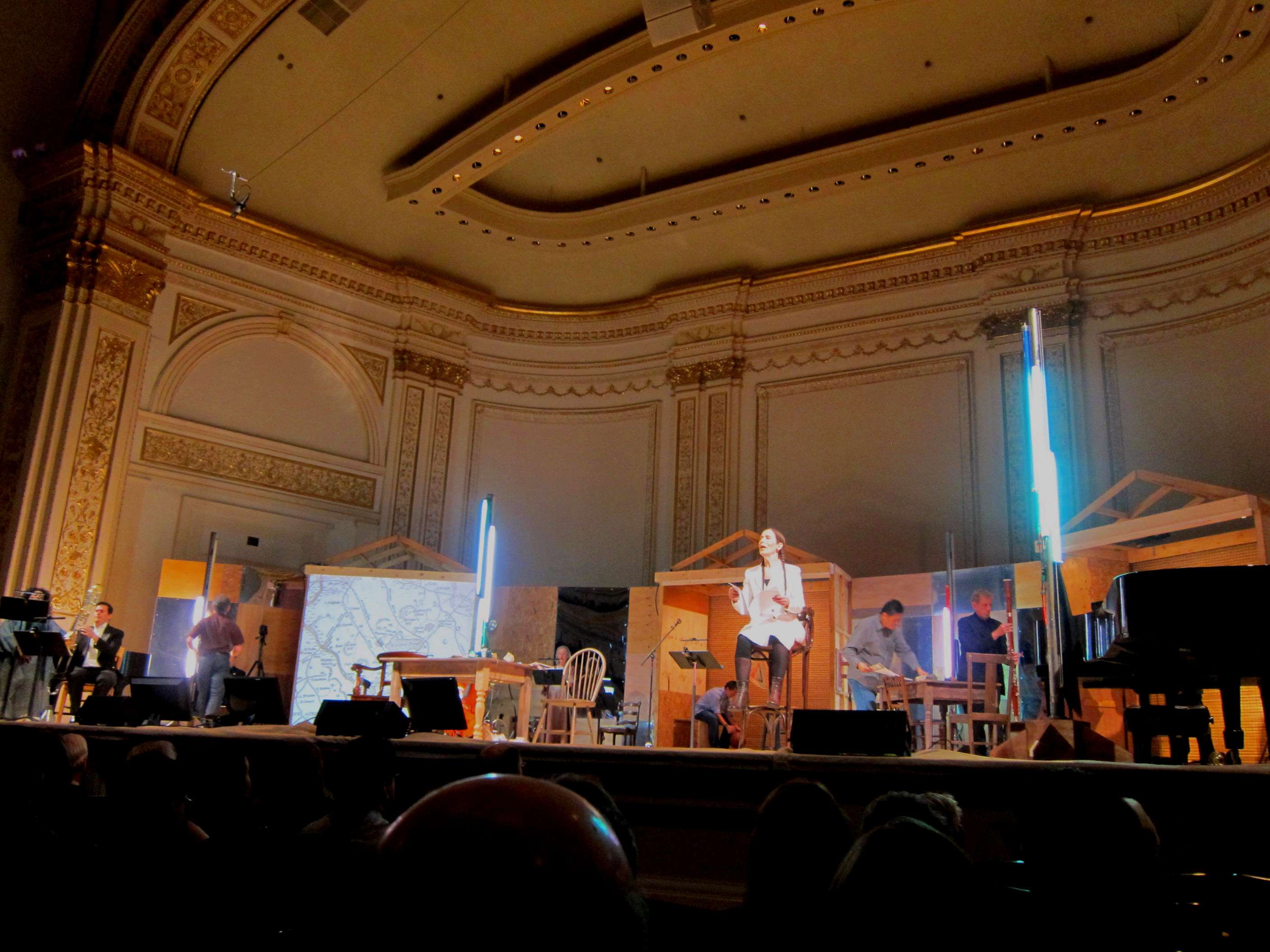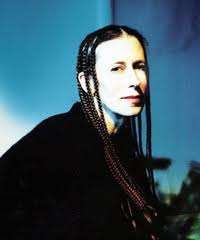|
Back
Ah, Glorious Mania! New York
Isaac Stern Auditorium, Carnegie Hall
03/27/2012 -
John Cage: Song Books
Henry Cowell: Synchrony
John Adams: Absolute Jest
Edgard Varèse: Amériques
Joan La Barbara, Meredith Monk (Vocalists), Jessye Norman (Soprano), St. Lawrence String Quartet: Geoff Nuttall, Scott St. John (Violins), Lesley Robertson (Viola), Christopher Costanza (Cello)
San Francisco Symphony, Michael Tilson Thomas (Music Director and Conductor)
Jesse Stiles (Electronics), Yuval Sharon (Stage Director)

Stage of Song Books (© Coco T. Dawg)
“maVERiCkMaVericKmaVEriCk” (John Cage writing)
In the 1960’s a John Cage “happening” was usually scrunched up on a West Village stage, 50 listeners sitting cheek to jowl with a piano or two, a tape recorder, a few musicians tripping over each other turning knobs.
Last night, for the opening of Michael Tilson Thomas’ full week of “American Mavericks” the modestly–titled John Cage Song Books wasgiven most immodest dimension. Spreading over the 64.3-foot-long Carnegie Hall stage, with a rapt dedicated audience of nearly 3,000, Song Books would have been a dream theatre to the iconoclastic iconic composer.
Like a surrealistic urban street, three videos were playing under arched roofs,–sometimes 19th Century lithographs, sometimes the live action on the stage or a map or words. The flickering garish fluorescent lights could have come out of the Bates Motel. A trombonist and violinist would saunter on and off after playing a note or two, and the singers didn’t know their places.
Meredith Monk took her Junoesque body around the stage, down to the auditorium and back again. Jessye Norman (yes, that Jessye Norman) plunked herself down at a table to warble a few notes, and the avant-garde soprano Joan La Barbara sung solos from all sides of the stage. Michael Tilson Thomas donned an old blue sweatshirt, wandered in, sat down, started to read, then tore up the book.
What we had in the Song Books–what could never ever be repeated on disc or DVD or a less spacious stage–was movement. Incessant movement, contrapuntal people and contrapuntal notes. What could never be ridiculed as John Cage “noises” disgourged a universe of sounds and energy, eccentric little dances, gargling notes and operatic soaring, all at once.
I don’t know how long Song Books lasted, for this was space without time. People, chairs, instruments, videos, songs, words, silences gathered over a quantum mechanism unmeasured and untethered.
If Michael Tilson Thomas had meant to startle us with the word “maverick”–a word degraded through its association with turd-rate American politicians–he succeeded. Except that after a few seconds, the Cage was not “startling”, it was an experience of sheer purely musical delight.

M. Monk (© J. Scott Shafer)
This first evening for a week of mavericks, was almost three hours long, but nobody was counting the minutes. For in its 100th year, the San Francisco Orchestra, while obviously one of the great American orchestra, is the pre-eminent orchestra for music of the future–even when the “future” music was written almost a century ago.
In fact, the most conservative work was by the only living composer, John Adams. His Absolute Jest (commissioned by Carnegie Hall and the San Francisco Symphony, with support from the Phyllis C. Wattis Fund for New Works of Music) was like the musical equivalent of palette consisting of a single color until we neared the canvas. What Mr. Adams had done with his unique orchestra–two trombones, percussion, strings and a solo string quartet–was bring in a number of well-known Beethoven scherzi (ergo the title), transforming them, breaking them apart and piling one on another along with his own music as glue.
The result was typical John Adams velocity, non-stop motion, with soloists of the St. Lawrence String Quartet winding around the orchestral strings in a non-stop vision part familiar, part pure energy Granted 23 minutes of this energy was somewhat enervating, but with Beethoven as the basis... well, Mr. Adams couldn’t have chosen a better composer to help him along.
Henry Cowell is rarely played in New York, because, outside of his trademark tone-clusters, his music has a frustrating variety of personae. His Irish piano music is a delight, his Persian music really sounds Persian, and his hymns and fugueing tunes are all-American.
This Synchrony, written for Martha Graham (though never danced), was a whirlwind of 17 minutes, starting with a long trumpet solo (played by Mark Inouye), with orchestral variations fanning out, enclosing upon each other, with a singular dexterity.
I was going to say that this showed the San Francisco Symphony at its most transparent under Mr. Tilson Thomas. But the aptheosis was the most astounding music of the evening, Edgard Varèse’ Amériques.
Few in the audience had heard it before, since this work, written in 1918, has to be more difficult technically, must deal with the most fantastic forces (125 players, at least), and through sheer volume would drive most audiences out into the streets screaming.
But what music!!! The title Amériques had no more to do with America than Kafka’s Amerika. Both works explored an imaginary world, both of theseworlds were pure imagination. But words–even Kafka’s words–are cheap. Making sounds like this belongs to the rarest of the rarest few.
The San Francisco Orchestra played Amériques as if they were born to the task. Cacophony after cacophony, every instrument playing at its extreme end, clashes of colors and tones that resembled a cataclysmic end of the universe.
Except for one thing. This end of this universe was so fascinating that nobody would notice its demise. Michael Tilson Thomas, who had started the evening by tearing up strips of paper for the Cage Song Books here tore up the entire orchestra into a shattering blasting tsunami of sounds, furies and eminently human rapture.
Andto think that we have five more days of Michael Tilson Thomas’ “American Maverick” music. It’s enough to turn the most blasé Manhattan concertgoer into an ecstatic maniac.
Harry Rolnick
|